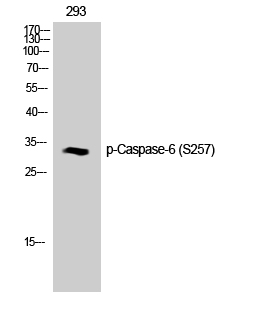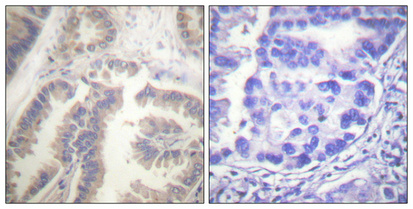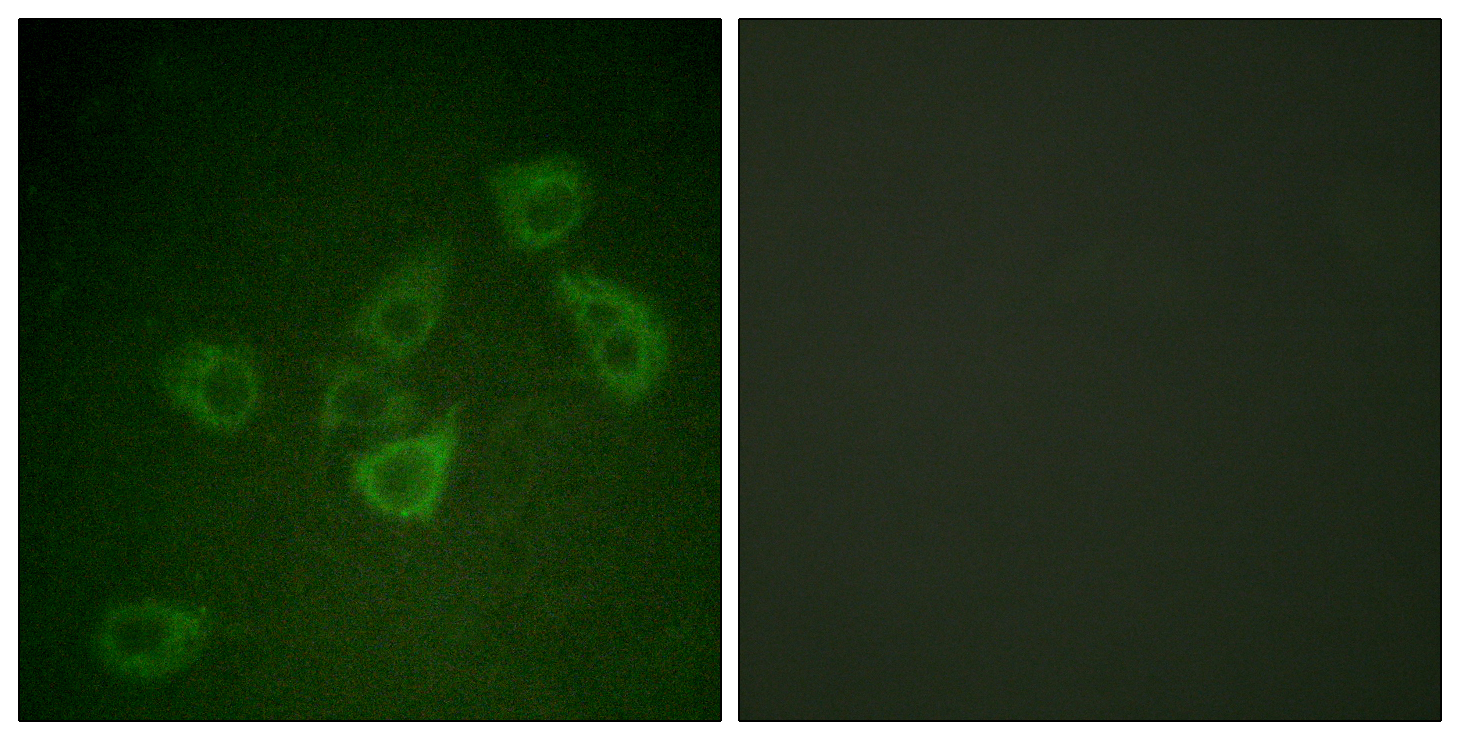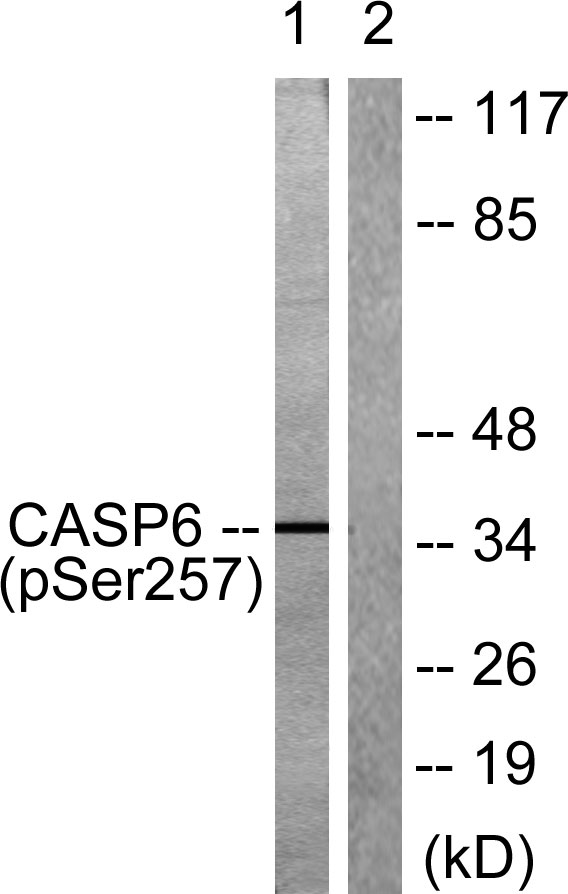Caspase-6 (phospho Ser257) Polyclonal Antibody
- Catalog No.:YP0044
- Applications:WB;IHC;IF;ELISA
- Reactivity:Human;Mouse;Rat
- Target:
- Caspase-6
- Fields:
- >>Apoptosis;>>Lipid and atherosclerosis
- Gene Name:
- CASP6
- Protein Name:
- Caspase6
- Human Gene Id:
- 839
- Human Swiss Prot No:
- P55212
- Mouse Gene Id:
- 12368
- Mouse Swiss Prot No:
- O08738
- Rat Swiss Prot No:
- O35397
- Immunogen:
- The antiserum was produced against synthesized peptide derived from human Caspase 6 around the phosphorylation site of Ser257. AA range:223-272
- Specificity:
- Phospho-Caspase-6 (S257) Polyclonal Antibody detects endogenous levels of Caspase-6 protein only when phosphorylated at S257.
- Formulation:
- Liquid in PBS containing 50% glycerol, 0.5% BSA and 0.02% sodium azide.
- Source:
- Polyclonal, Rabbit,IgG
- Dilution:
- WB 1:500 - 1:2000. IHC 1:100 - 1:300. IF 1:200 - 1:1000. ELISA: 1:20000. Not yet tested in other applications.
- Purification:
- The antibody was affinity-purified from rabbit antiserum by affinity-chromatography using epitope-specific immunogen.
- Concentration:
- 1 mg/ml
- Storage Stability:
- -15°C to -25°C/1 year(Do not lower than -25°C)
- Other Name:
- CASP6;MCH2;Caspase-6;CASP-6;Apoptotic protease Mch-2
- Observed Band(KD):
- 15,30kD
- Background:
- This gene encodes a member of the cysteine-aspartic acid protease (caspase) family of enzymes. Sequential activation of caspases plays a central role in the execution-phase of cell apoptosis. Caspases exist as inactive proenzymes which undergo proteolytic processing at conserved aspartic acid residues to produce two subunits, large and small, that dimerize to form the active enzyme. This protein is processed by caspases 7, 8 and 10, and is thought to function as a downstream enzyme in the caspase activation cascade. Alternative splicing of this gene results in multiple transcript variants that encode different isoforms. [provided by RefSeq, Oct 2015],
- Function:
- catalytic activity:Strict requirement for Asp at position P1 and has a preferred cleavage sequence of Val-Glu-His-Asp-|-.,enzyme regulation:Activation is suppressed by phosphorylation at Ser-257.,function:Involved in the activation cascade of caspases responsible for apoptosis execution. Cleaves poly(ADP-ribose) polymerase in vitro, as well as lamins. Overexpression promotes programmed cell death.,PTM:Cleavages by caspase-3, caspase-8 or -10 generate the two active subunits.,similarity:Belongs to the peptidase C14A family.,subunit:Heterotetramer that consists of two anti-parallel arranged heterodimers, each one formed by a 18 kDa (p18) and a 11 kDa (p11) subunit.,
- Subcellular Location:
- Cytoplasm . Nucleus .
- Expression:
- Lung,Lymphocyte,T-cell,
- June 19-2018
- WESTERN IMMUNOBLOTTING PROTOCOL
- June 19-2018
- IMMUNOHISTOCHEMISTRY-PARAFFIN PROTOCOL
- June 19-2018
- IMMUNOFLUORESCENCE PROTOCOL
- September 08-2020
- FLOW-CYTOMEYRT-PROTOCOL
- May 20-2022
- Cell-Based ELISA│解您多样本WB检测之困扰
- July 13-2018
- CELL-BASED-ELISA-PROTOCOL-FOR-ACETYL-PROTEIN
- July 13-2018
- CELL-BASED-ELISA-PROTOCOL-FOR-PHOSPHO-PROTEIN
- July 13-2018
- Antibody-FAQs
- Products Images

- Western Blot analysis of 293T cells using Phospho-Caspase-6 (S257) Polyclonal Antibody diluted at 1:1000

- Immunohistochemical analysis of paraffin-embedded Human lung cancer. Antibody was diluted at 1:100(4° overnight). High-pressure and temperature Tris-EDTA,pH8.0 was used for antigen retrieval. Negetive contrl (right) obtaned from antibody was pre-absorbed by immunogen peptide.

- Immunofluorescence analysis of HUVEC cells, using Caspase 6 (Phospho-Ser257) Antibody. The picture on the right is blocked with the phospho peptide.

- Immunohistochemistry analysis of paraffin-embedded human colon carcinoma, using Caspase 6 (Phospho-Ser257) Antibody. The picture on the right is blocked with the phospho peptide.

- Western blot analysis of lysates from 293 cells treated with Etoposide 25uM 60', using Caspase 6 (Phospho-Ser257) Antibody. The lane on the right is blocked with the phospho peptide.



